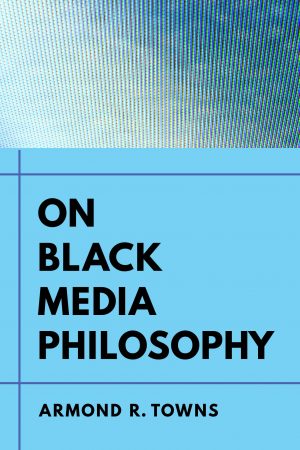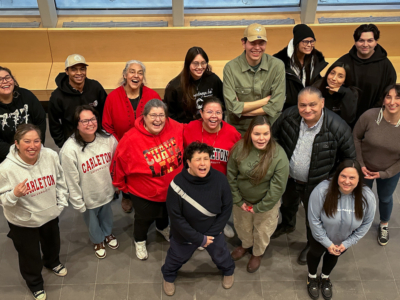“Even as they’re butting heads, they’re constantly overlapping”: Two years after releasing his first book, Dr. Armond R. Towns (Associate Professor – Communication & Media Studies) reflects on teaching at the intersection of Black Studies and Media Philosophy.
By Jaime Sadgrove
When Communication & Race, the first new journal from the National Communication Association (U.S.) in over two decades, launches later this year, it will have been thanks in large part to the work of Dr. Armond R. Towns, who serves as its cofounder and inaugural editor.

Professor Armond R. Towns
Dr. Towns came to Carleton as an Associate Professor in Communication and Media Studies in 2021. In the intervening years, he has published his first book, On Black Media Philosophy, co-founded the journal Communication and Race, and begun work on a new SHHRC-funded research project. Over the last three years, Dr. Towns’s interests have increasingly shifted towards the history of communication and media studies as a discipline, a focus which started to appear while he was working on his first book.

On Black Media Philosophy by Dr. Armond R. Towns (University of California Press, 2022).
Published in March 2022, On Black Media Philosophy critiques the concept of the human in media philosophy. Dr. Towns argues that in dominant media philosophy scholarship, the human is conceptualized as a white, western, capitalist, male figure. Dr. Towns then goes on to formulate a different idea of humanity for media philosophy to draw upon – one rooted in Black studies, that is multifaceted rather than singular, and that is not based on Western European anthropological traditions.
This exclusionary idea of who counts as “human” can be traced back to the very beginnings of media philosophy as a discipline and, specifically, the work of Marshall McLuhan. A Canadian scholar most famous for his expression “the medium is the message,” McLuhan is often seen as a foundational thinker in media theory. Dr. Towns said that the issues addressed in On Black Media Philosophy arise in McLuhan’s earliest work, and, more broadly, the disciplines which communication and media studies grew out of.
“McLuhan was an English professor and a trained rhetorician, and in the 19th and 20th centuries the English department was really at the heart of academic life,” Dr. Towns said. He went on to explain that through building a connection between English and the social sciences, scholars began to explore what we now call communication and media studies – but through a frame that saw European society as the epitome of culture and thought.

While McLuhan’s ideas are discussed in On Black Media Philosophy, Dr. Towns said the book isn’t actually about him – “McLuhan is more a vehicle through which I can discuss media philosophy.” Dr. Towns first discovered McLuhan’s work in graduate school, where he already had a background in Black studies. He found that the two disciplines – Black Studies and Media Philosophy – were both asking questions about what it means to be human, but the answers they arrived at didn’t align. “They’re constantly bumping heads, even as they’re overlapping,” Dr. Towns said. This friction became the basis of On Black Media Philosophy. Dr. Towns’s recent project, co-founding an editing a new journal, is also the product of friction – though a friction that is more institutional than theoretical.
The National Communication Association is one of the major organizations for communication scholars in the United States, and Communication and Race marks its first new journal since 2004. Dr. Towns said that the idea for the journal grew out of racism within the organization. “There were some pretty tense issues [of racism within the organization] about five or six years ago, and from those issues, there were a lot of institutional apologies.” These apologies felt inadequate, and Dr. Towns began to think that what was needed was not an apology, but an institutional space to write about issues of race within a communication context.

The first issue of the new journal Communication and Race will be released some time in 2024.
While race had become an increasingly publishable topic within the discipline, Dr. Towns explained that there wasn’t a lot of thinking about a journal focused on it, and so he got to work on a proposal. Once the bones were completed, he began reaching out to other scholars, and the proposal was accepted by the National Communication Association in 2021. When asked about the tension of housing this journal within an institution with a history of racism, Dr. Towns said it feels par for the course: “I could sit around and just be upset about racism, or I could try to mobilize resources from an institution that might feel guilty about that racism.” A key priority for the new journal is building a space for emerging scholars with an interest in publishing about race.
Two years on from publishing his book and with the first issue of Communication and Race about to be released, Dr. Towns said that while there is a good amount of scholarship about communication and race being released, he has noticed a shift in the way it is produced. “I’m starting to see an increased acceptance of what I would call European logics inside of scholarship that views itself as progressive. Part of my interest in the journal is having conversations about that and trying to create […] new ways to approach topics such as race without accepting the logics of race.”
Photos by Christopher Risch
Wednesday, February 28, 2024 in Communication News, ComsFacultyBooks
Share: Twitter, Facebook



